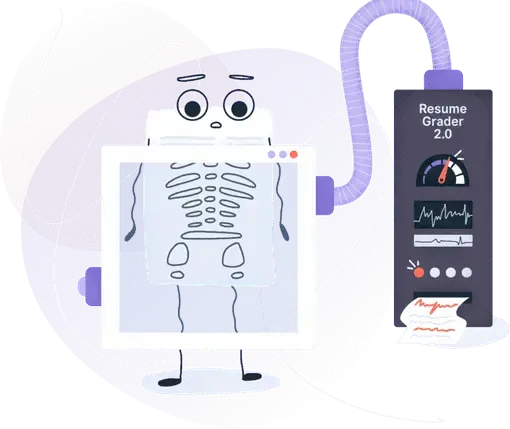How to Emphasize Emotional Intelligence on Your Resume
Here are the top ways to show your Emotional Intelligence skills on your resume. Find out relevant Emotional Intelligence keywords and phrases and build your resume today.


Is your resume ATS-friendly?
Drop your resume here or upload a file to find out if the skills in your resume are readable by an ATS.
What is emotional intelligence?
Emotional intelligence, also known as emotional quotient (EQ), is most often defined as the ability to perceive, use, understand, manage, and handle emotions. EQ also can be defined as the capacity to be aware of, control, and express emotions, and to handle interpersonal relationships judiciously and empathetically.
Emotional intelligence in a workplace refers to a person’s ability to work productively with person-to-person emotions. Employees with high EQ can manage their own emotions, are self-aware, and can help relieve stress more easily, communicate effectively with their coworkers, manage challenges better and empathize with those around them.
Unlike people with high EQ, employees with lower EQ may come across as bullies or as arrogant. They can’t work well with others and lack interpersonal skills. In the modern workplace, employers are working hard to find people with emotional intelligence skills and to develop them in their employees.
Why emotional intelligence is important on your resume / why emotional intelligence is wanted by recruiters on your resume?
Emotional intelligence is mentioned more and more in the workplace. Employers are looking for candidates who do not just have specific related skills but are also able to communicate and be team players.
More often, job descriptions mention interpersonal and communication skills in their listing. Team Working skills are also one of the most desirable skills from recruiters. All of those skill sets in employees can make the workplace more successful.
Developing and showcasing your emotional skills can contribute to your role in the company and help you become a valuable employee.
What skills, activities, and accomplishments help you highlight your emotional intelligence?
To impress potential employers and be considered for the position, it is not enough to just list emotional intelligence or interpersonal skills on your resume. You have to add the right keywords and skillset to showcase your emotional intelligence. This list will help you to have a better understanding of your EQ abilities and how to describe them on your resume:
Relationship management refers to your ability to form and sustain productive, functional, and healthy relationships with the people you work with. This means communicating assertively; giving and receiving negative feedback; managing conflict, and understanding how to effectively manage the emotional dynamics of a team or group.
Self-management is being organized. The ability to manage your workflow and productivity in the workplace without reliance on a supervisor. This skill enables you to juggle different tasks without becoming overwhelmed or stressed. It is connected to your ability to multitask.
Social Skills refer to the skills needed to handle and influence other people’s emotions effectively. Demonstrating these skills shows that you can work well with people and as a part of a team.
Self-Awareness is the ability to understand your emotions and don't let your feelings rule your behavior. Know your strengths and weaknesses, and work on these areas, so you can perform better. Self-Awareness is one of the most important parts of emotional intelligence.
How to demonstrate emotional intelligence on your resume?
- Describe actions that indicate you are insightful and understand emotions well.
- Display your skills that best describe your emotional intelligence on your resume.
- Showcase emotional management.
- Give examples of successfully resolved conflicts with customers or coworkers and achieved a positive outcome.
Example 1: Demonstrate emotional intelligence in the experience section
- •Assists employees and management in the interpretation and communication of Human Resources policies, procedures, programs, and the Employee Handbook and ensure that any employee concerns are addressed.
- •Assisted/reviewed with Managers on employee relations verbal/written.
- •Effectively interface with all levels of employees in the organization
- •Worked collaboratively with department managers and executive leadership to develop and implement specific people programs, policies, processes, and systems.
Emotional intelligence involves being someone who understands, collaborates, and communicates well with others.
You can demonstrate your EQ in your achievement section on your resume by providing examples of your relationship management and social skills.
Provided examples show their experience in managing different and perhaps complicated relationships between employees and management. They also exhibit their social skills by navigating and influencing other people’s emotions, serving as a mediator between their coworkers.
They also proved their teamwork skills by working collaboratively with department managers and executive leadership.
Example 2: Demonstrate emotional intelligence in the resume summary section
Emphasize your emotional intelligence on your resume summary by using strong statements of your social and relationship management skills.
The example provides the key qualities of a person who has emotional intelligence. They are self-motivated and have leadership qualities. They demonstrate social skills and work well with people and as a part of a team.
Furthermore, they can also form and sustain productive, functional, and healthy relationships with the people they work with.
Example 3: Show your emotional intelligence in your achievements sections
It is advisable to give examples in the achievement section on your resume to emphasize your emotional intelligence.
The provided examples showcase that they can work well with people and as a part of a team.
They also have experience communicating with big teams and constantly improving team performance.
Applying that, they can handle conflicts and effectively manage the emotional dynamics of the team.
They also have the social skills to effectively handle and influence other people’s emotions and motivation.
Emotional intelligence: key takeaways for your resume
- To showcase your emotional intelligence in your resume, you have to communicate the actions fueled by your emotional intelligence.
- Describe actions that demonstrate your ability to work productively with person-to-person emotions.
- Do not miss demonstrating your EQ skillset all over your resume. Specifically in your summary, your job descriptions, and your achievements section.
- Show your experience in mitigating stress and respond well to emotionally heavy circumstances.
- Give hints toward your strength in emotional comprehension.
Make one that's truly you.




